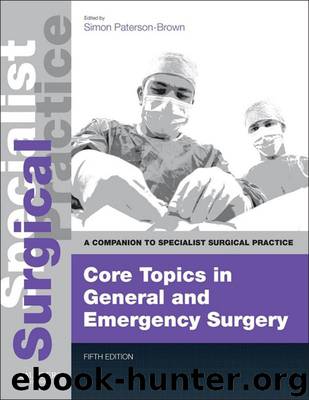Core Topics in General & Emergency Surgery: Companion to Specialist Surgical Practice by Paterson-Brown MBBS MPhil MS FRCS Simon

Author:Paterson-Brown MBBS MPhil MS FRCS, Simon [Paterson-Brown MBBS MPhil MS FRCS, Simon]
Language: eng
Format: epub
ISBN: 9780702049729
Publisher: Elsevier Health Sciences UK
Published: 2013-06-24T00:00:00+00:00
10
Colonic emergencies
David E. Beck
Introduction
Emergency conditions of the large bowel are common and changes in their evaluation and management have continued. Rather than rushing the patient to the operating room after a token resuscitation, current standards suggest that an initial appropriate period of resuscitation along with physiological and radiological evaluation should be undertaken. Many patients with colonic conditions can be managed non-operatively with bowel rest, antibiotics and blood components. Comorbid disease such as cardiac, pulmonary and metabolic conditions are optimised and critically ill patients are monitored in an intensive care setting. If adequate facilities and personnel are not readily available, transfer to a tertiary care facility should be considered if the patient can be readily stabilised.
The operative mortality for emergency colon resections is two to three times that associated with elective resection. As a result, surgeons have investigated ways of stabilising patients in order to convert emergency into more planned, elective procedures. Deciding if and when to operate can be difficult, and active observation and consultation with colleagues is often helpful in the decision-making process. Active participation of the attending/consultant surgeon in both the assessment and operative procedure is essential in this group of very challenging patients.
When emergency surgery is necessary, there has been a clear trend towards single rather than staged procedures for large-bowel disorders. When feasible, this approach reduces the length of hospital stay and avoids the risks of multiple operations. However, in some unfit or acutely septic patients, a staged approach may still be preferable.
Download
Core Topics in General & Emergency Surgery: Companion to Specialist Surgical Practice by Paterson-Brown MBBS MPhil MS FRCS Simon.epub
This site does not store any files on its server. We only index and link to content provided by other sites. Please contact the content providers to delete copyright contents if any and email us, we'll remove relevant links or contents immediately.
| Anesthesiology | Colon & Rectal |
| General Surgery | Laparoscopic & Robotic |
| Neurosurgery | Ophthalmology |
| Oral & Maxillofacial | Orthopedics |
| Otolaryngology | Plastic |
| Thoracic & Vascular | Transplants |
| Trauma |
Periodization Training for Sports by Tudor Bompa(8254)
Why We Sleep: Unlocking the Power of Sleep and Dreams by Matthew Walker(6706)
Paper Towns by Green John(5179)
The Immortal Life of Henrietta Lacks by Rebecca Skloot(4581)
The Sports Rules Book by Human Kinetics(4379)
Dynamic Alignment Through Imagery by Eric Franklin(4208)
ACSM's Complete Guide to Fitness & Health by ACSM(4057)
Kaplan MCAT Organic Chemistry Review: Created for MCAT 2015 (Kaplan Test Prep) by Kaplan(4009)
Introduction to Kinesiology by Shirl J. Hoffman(3766)
Livewired by David Eagleman(3765)
The Death of the Heart by Elizabeth Bowen(3610)
The River of Consciousness by Oliver Sacks(3599)
Alchemy and Alchemists by C. J. S. Thompson(3516)
Bad Pharma by Ben Goldacre(3422)
Descartes' Error by Antonio Damasio(3271)
The Emperor of All Maladies: A Biography of Cancer by Siddhartha Mukherjee(3155)
The Gene: An Intimate History by Siddhartha Mukherjee(3095)
The Fate of Rome: Climate, Disease, and the End of an Empire (The Princeton History of the Ancient World) by Kyle Harper(3056)
Kaplan MCAT Behavioral Sciences Review: Created for MCAT 2015 (Kaplan Test Prep) by Kaplan(2984)
